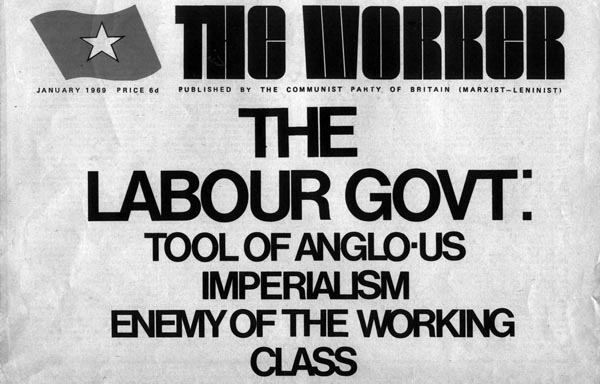In the second of a series of articles to mark the 40th anniversary of the CPBML by looking at the past four decades through the eyes of Workers and its predecessor, The Worker, we look at the planned, but not executed, engineers' strike of 1968...
1969: Focus on the engineers, and on Britain
WORKERS, FEB 2008 ISSUE

Amid world turmoil and struggle, our party was formed in April 1968. Our founding chairman, Reg Birch, had issued a call to all interested persons in the labour movement and beyond to join our founding congress, which thus went on to create the only revolutionary communist party that Britain has ever known.
In those distant times the world was cluttered with so-called "Marxist-Leninists" who wore huge Mao badges and prattled on about every struggle in the world bar our own. But our fledgling party soon moved to the production of a newspaper. From the off, we were determined to establish our credentials and focus on the problems in Britain.
In October 1968 an issue called October appeared. October revealed from the outset that our party had a perspective firmly rooted in our own country, illustrated by the lead article reporting a forthcoming strike against the engineering employers, who were supporting the then Labour government's incomes policy. On the back page the paper included the thoughtful and rooted "Jottings of an Engineer", extracts of which we reproduce.
"What is the strike about? Ostensibly, the claim is for a minimum wage increase for all workers, a new wages structure, three weeks' holiday now and equal pay – and so it is – but the question goes much deeper. First, it is essential to remember that, for the past decade, engineering workers in particular and all other workers, have been steadfastly indoctrinated that they must work harder, produce much more, must not be avaricious, not work for improvement in wages and working conditions, that they can be faced with alleged technical developments and expected to throw overboard traditions related to craft and skill.
"It has been said that workers of all kinds must be prepared, in the course of a life-time of working to learn two, or even more, skills to keep pace with technical developments. The whole canvas has been that unless we produce more, the economics of this country must founder.
"The fact of the matter is that wages have never been related to production in terms of cost...
"We must say that there shall be no attempt nationally to interfere with the right of free collective bargaining at the point of production, that we must end the past history of procrastination and downright cheating by the employers. They must be taught that organised labour has come of age and their day is passing."
A couple of months later, in January 1969, a regular monthly paper, The Worker, was launched. In the first issue we returned to analyse the engineering strike that had not happened. Here is part of the article:

Issue number one of The Worker, January 1969. "Following their failure to do battle with the Government and the employers there have come even more open declarations of war; legislation against the unions, 'cooling off periods', strengthening of the Donovan Report and so forth. If there is to be built a disciplined political movement of revolutionary character, then workers must accept the necessity of opposing the enemy in a political way.
"On October 19th the Executive of the [Amalgamated Engineering Federation] unanimously called upon its National Committee to endorse the call for strike action of members on October 21st. This was rejected by 27-25. Why was this?
"In all the hot house atmosphere of negotiations with the Engineering Employers, and not least of all with the First Secretary of State, over engineering wages and working conditions, nothing could change the general direction of the Government's drive to fetter the unions and assist the employing class except a frontal attack on both the Employers and their spokesmen, the Labour Government.
"When after hours and hours of negotiations, the breakdown came about in regard to women's wages, this was the time not only to call for but to demand battle by the engineering workers against their oppressors, to accept the unanimous decision of the Executive Council which said simply: 'In view of the unsatisfactory nature of the Employers' offer our members must be on strike from October 21st unless a satisfactory settlement is reached.' This would have placed the economic battle in a true political perspective.
"This [refusal to fight] comes about from incessant propaganda over many years, from the pressure of the Labour Government, from the Prices and Incomes Board, from all the hectoring that has gone on for a decade now about restrictive practices, about efficiency, mobility and flexibility, work measurement, modernisation, rationalisation and all the other jargon of bourgeois economists and industrial consultants hired by the bosses.
"This has bitten deep into the trade union and labour movement and has produced passive acceptance of wage freezes. From time to time artificial battles are fought on whether there should be an improvement in the economy of 2.5% or 3.5%; but the real issues have gone by default.
"This same acceptance of the enemy's case has entered industry, on the factory floor...In many factories now workers have entered into these dubious bargains for immediate gains. They have sold tea-breaks, washing time, have dispensed with mates, etc.
"The leadership in particular is permeated with this doctrine and has come to accept that workers have had as much as they can expect on present labour and must work harder, produce more, speed up, extend their versatility, increase overall output to get a little more back. It is the soup bowl of Marx all over again and we have forgotten his excellent advice – it is the size of the spoon we hold that matters!
"...Until such time as the workers force the leadership of the trade unions to give up their support of the Labour Government and its Incomes Policy there can be no change."